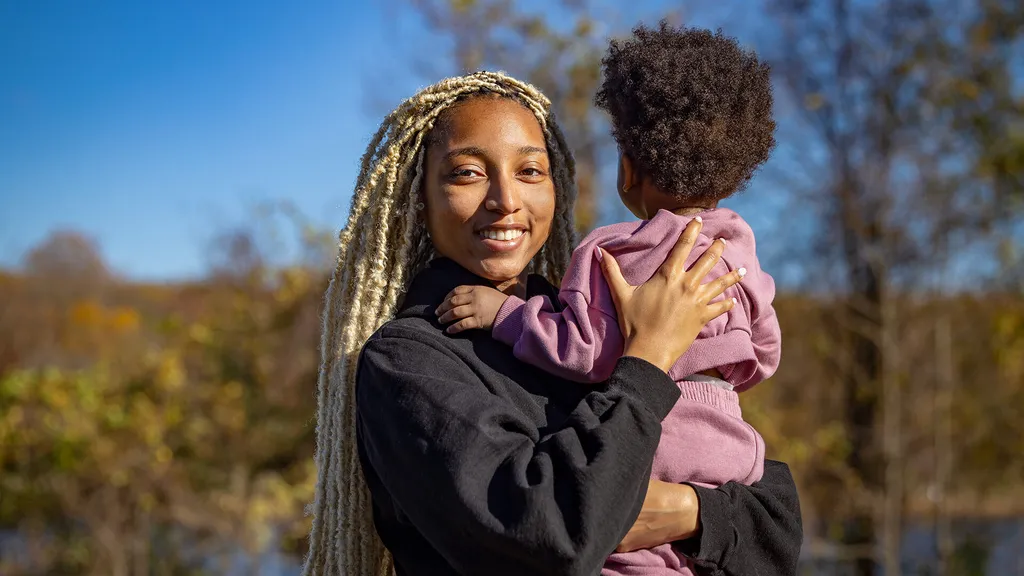- November 11, 2024
- By Karen Shih ’09
Amaya Johnson never had a moment to catch her breath as she rushed out of her 8 a.m. math class every Tuesday and Thursday last spring. She had to reach her car parked on the edge of campus and drive 20 minutes to her grandparents’ house in Lanham, Md., to nurse her infant daughter.
While feeding the baby, Johnson typed out essays on her laptop or caught up on assigned reading. Sometimes she was able to sneak a bite for herself, but other times she jumped back in her car still hungry to make it to her next class.
“I had a time last semester,” said 24-year-old Johnson, who plans to study kinesiology and physics. “I probably won’t think back on it in four years, but it was really, really tough for a while.”
Luckily, her professors were supportive, offering extensions and alternate assignments when she needed them, and she earned a 3.6 GPA during her first semester back after a four-year hiatus.
But barriers persist for parenting students, who make up nearly 20% of the U.S. undergraduate population. They’re more likely to not only be first-generation college attendees and to be low-income, but to delay starting higher education, be enrolled part-time and transfer between multiple institutions, which can lead to lower lifetime earnings and higher debt, according to the Urban Institute.

Now, Johnson has joined a School of Public Health research team’s Parent Advisory Council, working with other investigators at Florida State and Montclair State in New Jersey on a new study meant to shed light on the needs of parenting undergraduate students.
“They’re a hidden population in the student body. Often they’re afraid to disclose that they’re parents, because they worry they’ll be judged or professors won’t understand,” said behavioral and community health Associate Professor Elizabeth Aparicio, who leads the Community THRIVES Lab and is co-principal investigator of the study with Professor Svetlana Shpiegel of Montclair State. Aparicio has worked with young parents as a volunteer, social worker and researcher for two decades.
This summer, Aparicio, Shpiegel, and doctoral candidate Carson Peters started regularly convening parenting undergrads, university administrators and researchers from across the three universities to develop a survey and conduct key informant interviews, funded by the Spencer Foundation. They hope to figure out how many undergraduate students are parents on each campus—they’re untracked at UMD and many other colleges—and the supports they need to complete a four-year degree.
The researchers’ goal is to identify “low-threshold, transformational practices” that universities across the country could implement at minimal cost. These could include priority registration so students can better pick classes that align with their child care coverage; campus housing options that would allow children to live with their parents; or the creation of student parent groups to cultivate camaraderie and support.
“We want to make sure education is accessible,” said Peters. “Sometimes these (student) voices are on the margins. It’s important to forefront these voices to create opportunities that are designed, intentional and work for them.”
Keeping these students in school is a boon to the university community, said kinesiology Lecturer Ron Mower, who teaches KNES225 “Hoop Dreams: Black Masculinity and Sport,” which Johnson took in the spring.
As educators, “we need to be attendant to the different lived experiences our students have, and incorporate those perspectives and backgrounds,” he said, noting that Johnson’s openness about being a mom enriched a class discussion about tennis player Serena Williams and her harrowing birth experience as a Black mother. “What Amaya is doing is really commendable. She’s really a tremendous student, with a commitment to her educational journey and a desire to help others.”
Johnson has found that constant communication is key; she tells her professors about her situation at the start of the semester, and keeps them in the loop if her child care falls through or if she needs an extension because her daughter was sick all weekend. While she continues to work with the researchers on their study, she also hopes to lead by example, potentially starting a new student group for fellow parenting undergrads.
“I would love to have someone to soundboard with, so we could help each other,” she said.
The Community THRIVES Lab has launched a Student Parent Hub in partnership with SheRises, distributing essential items like diapers and wipes on campus. Complete the linked form to schedule a time to pick up or drop off, and email communitythriveslab@umd.edu with any questions.
